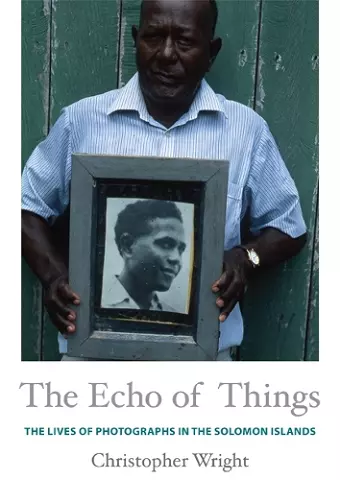The Echo of Things
The Lives of Photographs in the Solomon Islands
Format:Paperback
Publisher:Duke University Press
Published:13th Nov '13
Currently unavailable, and unfortunately no date known when it will be back

The Echo of Things is a compelling ethnographic study of what photography means to the people of Roviana Lagoon in the western Solomon Islands and a provocative inquiry into our own understandings of photography.
The Echo of Things is a compelling ethnographic study of what photography means to the people of Roviana Lagoon in the western Solomon Islands. Christopher Wright examines the contemporary uses of photography and expectations of the medium in Roviana, as well as people's reactions to photographs made by colonial powers in the late nineteenth and early twentieth centuries. For Roviana people, photographs are unique objects; they are not reproducible, as they are in Euro-American understandings of the medium. Their status as singular objects contributes to their ability to channel ancestral power, and that ability is a key to understanding the links between photography, memory, and history in Roviana. Filled with the voices of Roviana people, The Echo of Things is both a nuanced study of the lives of photographs in a particular cultural setting and a provocative inquiry into our own understandings of photography.
"The Echo of Things is a very fine book based on Christopher Wright's deep understanding of photographic technologies and artifacts and the lives of those artifacts in a specific milieu. Evoking the diverse uses and valuations of images among Solomon Islanders during the 1990s and 2000s, it is classical ethnography in the best sense; it is a dedicated study in which the locals do a lot of the talking."—Nicholas Thomas, author of In Oceania: Visions, Artifacts, Histories
"Christopher Wright argues persuasively that photography is thought of in Roviana (Solomon Islands) as a kind of echo, a trace that physically conflates image and sound in reproducing its object. He attends carefully to Roviana perspectives and practices yet deftly locates them in the context of the global theorization of photography and its many vernacular uses. Drawing on richly detailed ethnography, he uses analysis of one society's response to the medium to elucidate important debates across anthropology and photography more broadly."—Jane Lydon, author of Eye Contact: Photographing Indigeneous Australians
"Echoes of history figured in light and shade across the colonial divide, this precise yet loving account of a non-Western visual culture teaches me once again how little I see but how much Christopher Wright can show about the startling possibilities within those limitations."—Michael Taussig, Columbia University
"A highly valuable contribution to the study of vernacular photography." -- Gilles de Rapper * Anthropological Notebooks *
“[S]cholars have not undertaken the book-length analysis of a single island or a specific historical period that Wright attempts. This makes The Echo of Things an important contribution to the field of the history of photography in the Pacific. It is a carefully argued and compelling read, and hopefully a benchmark study to be replicated by future researchers as well as curators and archivists in the islands.” -- Max Quanchi * CAA Reviews *
“Anyone who has lived or worked in island societies like those in this book – the Western Solomon Islands – will delight in the wide variety of stories that lay bare the social life of photographs in these communities.” -- Geoffrey M. White * Oceania *
“This is a careful, sensitive ethnography that contains compelling portraits of people of Roviana for whom I hope the book is an important contribution…. This is… a book that very successfully argues for photographs as a means of allowing for and understanding that a single uncontested history is impossible and, like Faletau’s battered briefcase, can contain the possibility of multiple histories.” -- Andrea Low * Pacific Affairs *
“[T]his book is evidence—if evidence was needed—of the sheer diversity and vibrancy of the ethnographic mode of research and writing and its ability to adapt, change and incorporate elements from its and others’ histories, while at the same time acknowledging and incorporating—rather than defensively shielding against— the insights of cultural theory and anthropology’s post–Writing Culture experiments with writing. As it succeeds in doing just that, this is a wholly welcome contribution to an ongoing debate, and it remains a productive provocation for future work in the field.” -- Peter Kilroy * Cultural Critique *
ISBN: 9780822355106
Dimensions: unknown
Weight: 535g
240 pages